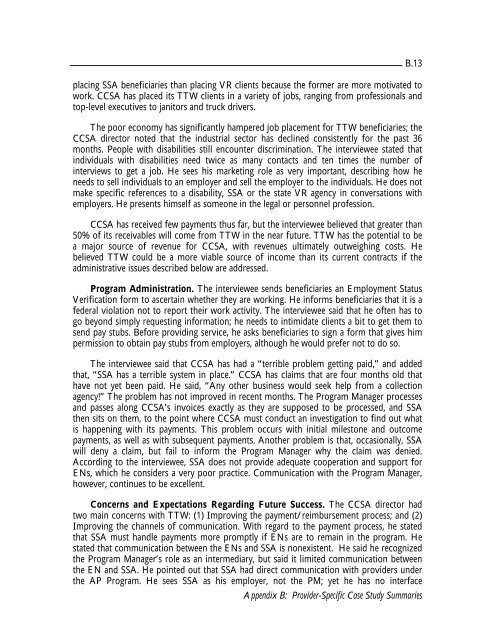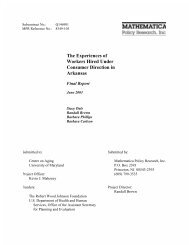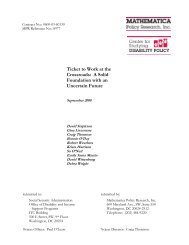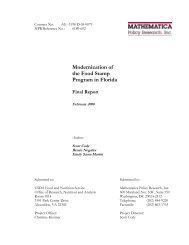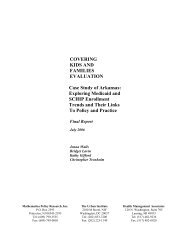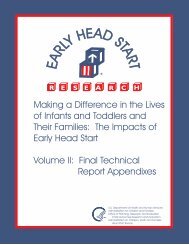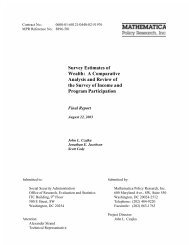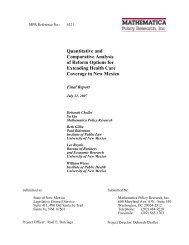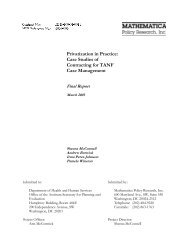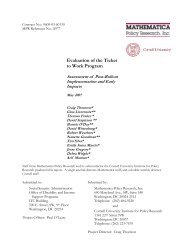Evaluation of the Ticket to Work Program Initial Evaluation Report
Evaluation of the Ticket to Work Program Initial Evaluation Report
Evaluation of the Ticket to Work Program Initial Evaluation Report
Create successful ePaper yourself
Turn your PDF publications into a flip-book with our unique Google optimized e-Paper software.
B.13<br />
placing SSA beneficiaries than placing VR clients because <strong>the</strong> former are more motivated <strong>to</strong><br />
work. CCSA has placed its TTW clients in a variety <strong>of</strong> jobs, ranging from pr<strong>of</strong>essionals and<br />
<strong>to</strong>p-level executives <strong>to</strong> jani<strong>to</strong>rs and truck drivers.<br />
The poor economy has significantly hampered job placement for TTW beneficiaries; <strong>the</strong><br />
CCSA direc<strong>to</strong>r noted that <strong>the</strong> industrial sec<strong>to</strong>r has declined consistently for <strong>the</strong> past 36<br />
months. People with disabilities still encounter discrimination. The interviewee stated that<br />
individuals with disabilities need twice as many contacts and ten times <strong>the</strong> number <strong>of</strong><br />
interviews <strong>to</strong> get a job. He sees his marketing role as very important, describing how he<br />
needs <strong>to</strong> sell individuals <strong>to</strong> an employer and sell <strong>the</strong> employer <strong>to</strong> <strong>the</strong> individuals. He does not<br />
make specific references <strong>to</strong> a disability, SSA or <strong>the</strong> state VR agency in conversations with<br />
employers. He presents himself as someone in <strong>the</strong> legal or personnel pr<strong>of</strong>ession.<br />
CCSA has received few payments thus far, but <strong>the</strong> interviewee believed that greater than<br />
50% <strong>of</strong> its receivables will come from TTW in <strong>the</strong> near future. TTW has <strong>the</strong> potential <strong>to</strong> be<br />
a major source <strong>of</strong> revenue for CCSA, with revenues ultimately outweighing costs. He<br />
believed TTW could be a more viable source <strong>of</strong> income than its current contracts if <strong>the</strong><br />
administrative issues described below are addressed.<br />
<strong>Program</strong> Administration. The interviewee sends beneficiaries an Employment Status<br />
Verification form <strong>to</strong> ascertain whe<strong>the</strong>r <strong>the</strong>y are working. He informs beneficiaries that it is a<br />
federal violation not <strong>to</strong> report <strong>the</strong>ir work activity. The interviewee said that he <strong>of</strong>ten has <strong>to</strong><br />
go beyond simply requesting information; he needs <strong>to</strong> intimidate clients a bit <strong>to</strong> get <strong>the</strong>m <strong>to</strong><br />
send pay stubs. Before providing service, he asks beneficiaries <strong>to</strong> sign a form that gives him<br />
permission <strong>to</strong> obtain pay stubs from employers, although he would prefer not <strong>to</strong> do so.<br />
The interviewee said that CCSA has had a “terrible problem getting paid,” and added<br />
that, “SSA has a terrible system in place.” CCSA has claims that are four months old that<br />
have not yet been paid. He said, “Any o<strong>the</strong>r business would seek help from a collection<br />
agency!” The problem has not improved in recent months. The <strong>Program</strong> Manager processes<br />
and passes along CCSA’s invoices exactly as <strong>the</strong>y are supposed <strong>to</strong> be processed, and SSA<br />
<strong>the</strong>n sits on <strong>the</strong>m, <strong>to</strong> <strong>the</strong> point where CCSA must conduct an investigation <strong>to</strong> find out what<br />
is happening with its payments. This problem occurs with initial miles<strong>to</strong>ne and outcome<br />
payments, as well as with subsequent payments. Ano<strong>the</strong>r problem is that, occasionally, SSA<br />
will deny a claim, but fail <strong>to</strong> inform <strong>the</strong> <strong>Program</strong> Manager why <strong>the</strong> claim was denied.<br />
According <strong>to</strong> <strong>the</strong> interviewee, SSA does not provide adequate cooperation and support for<br />
ENs, which he considers a very poor practice. Communication with <strong>the</strong> <strong>Program</strong> Manager,<br />
however, continues <strong>to</strong> be excellent.<br />
Concerns and Expectations Regarding Future Success. The CCSA direc<strong>to</strong>r had<br />
two main concerns with TTW: (1) Improving <strong>the</strong> payment/reimbursement process; and (2)<br />
Improving <strong>the</strong> channels <strong>of</strong> communication. With regard <strong>to</strong> <strong>the</strong> payment process, he stated<br />
that SSA must handle payments more promptly if ENs are <strong>to</strong> remain in <strong>the</strong> program. He<br />
stated that communication between <strong>the</strong> ENs and SSA is nonexistent. He said he recognized<br />
<strong>the</strong> <strong>Program</strong> Manager’s role as an intermediary, but said it limited communication between<br />
<strong>the</strong> EN and SSA. He pointed out that SSA had direct communication with providers under<br />
<strong>the</strong> AP <strong>Program</strong>. He sees SSA as his employer, not <strong>the</strong> PM; yet he has no interface<br />
Appendix B: Provider-Specific Case Study Summaries


